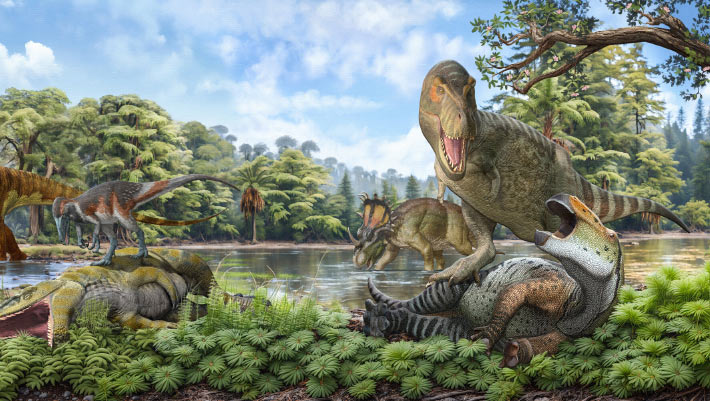Now Reading: Unveiling the Origin: New Research Traces Tyrannosaurus Rex’s Ancestry
-
01
Unveiling the Origin: New Research Traces Tyrannosaurus Rex’s Ancestry
Unveiling the Origin: New Research Traces Tyrannosaurus Rex’s Ancestry

Swift Summary
- A study led by University College London paleontologists suggests that the genus Tyrannosaurus likely arose in North America, with direct ancestors migrating from Asia over 70 million years ago via the Bering Strait.
- Fossil evidence indicates that T. rex, despite its North American dominance, was closely related to Asian species like Tarbosaurus compared to North American relatives such as Daspletosaurus.
- Researchers proposed that T. rex and related tyrannosaurs adapted well to cooler climates following global temperature cooling around 92 million years ago, possibly aided by traits like feathers or warm-blooded physiology.
- Mathematical modeling incorporating fossil data and climate history suggests gaps remain in identifying the exact ancestors of Tyrannosaurus rex, possibly lying undiscovered in Asia.
- Megaraptors, a mysterious cousin group of tyrannosaurs with slender heads and large claws for hunting prey such as sauropod juveniles, were found more widely distributed across Gondwana than previously thoght. they originated around 120 million years ago in Asia before spreading globally but remained distinct from tyrannosaurs due to differing evolutionary paths.
- Both megaraptors and tyrannosaurs grew rapidly into apex predators during cooling periods coinciding with the extinction of earlier giant carnivores like carcharodontosaurids around 90-92 million years ago.
Indian opinion Analysis
This research underscores how species migration driven by climatic shifts shapes evolutionary trajectories on a global scale. The findings regarding fossil gaps highlight uncertainties common in paleontology but open avenues for exploration-Asia especially could yield groundbreaking discoveries relevant not only to understanding dinosaur evolution but also broader ecological dynamics from historical climates. The focus on adaptation to cooling temperatures may resonate globally today amid rising concerns about climate-induced biodiversity changes.
For India, this emphasizes participation opportunities within international academic collaborations exploring prehistoric ecosystems spanning Gondwana (which included parts of present-day India). Such studies can deepen insights into India’s own geologic history while underscoring its unique positioning within evolving scientific debates about global environmental change and intercontinental connectivity across eras.
























